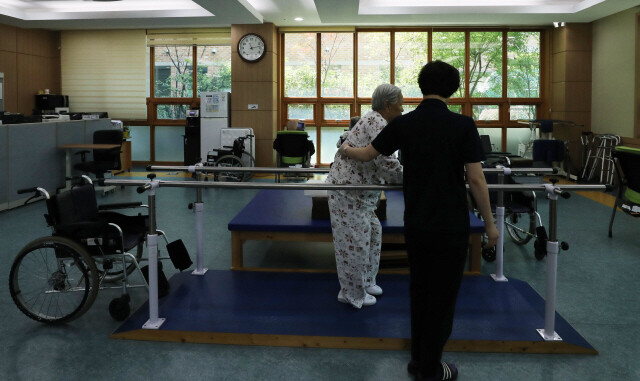To non-face-to-face physical therapists
I couldn’t even touch the body model last year
 .” alt=”A nursing home physical therapy room. Material photo of
.” alt=”A nursing home physical therapy room. Material photo of A nursing home physical therapy room. <한겨레> Material photo.
Park Amugae (25), who is in the second year (three-year program) of the Department of Physical Therapy at a junior college in Jeonnam, has never touched a body model used in physical therapy practice last year. Previously, they learned how to treat each body part, such as limbs, using body models while confronting a professor in a practice room. However, all of the training was canceled when faced with Corona 19. Education is all about the professor putting the body model and demonstrating it through online video. It is important to learn the skills by hand, but in fact, I only took theory classes. “The professor gives lectures enthusiastically, but there are many cases where I don’t understand because I haven’t tried it myself. There is also a practical exam in the physical therapist exam, but I am anxious if I can prepare properly.” College students built to foster professional professionals are affirmed by the prolonged period of time in which education such as face-to-face practice due to Corona 19 is not progressing smoothly. Junior colleges have a high proportion of practical and practical education that can be used immediately in the job market, but students complain of anxiety that the’lack of education’ will affect employment. It is not easy for them to find a place for field training right away. Yoon Amugae (24), a second-year student majoring in social welfare at a two-year college, tried to go on field training at a nursing home at the end of last year, but the nursing home rejected it because of Corona 19 and delayed the practice to this summer. Yoon said, “To get the second class of social worker, we have to go on-site training for 160 hours, but we are worried that we will not be able to practice because the corona situation is bad this year.” Lee Yoo-jin (21), a third-year student studying early childhood education at a junior college in Gyeonggi-do, said, “Last year, I had to go on-site training for 6 weeks to obtain a level 3 license as a nursery teacher. He said, “Some of the motives are notified that the training is not possible due to concerns about Corona 19 on the day of work at the daycare center.” Their anxiety intensifies in the face of the already frozen job market. Shin Chae-rin (20), who is admitted to the senior year of the tourism management department (two-year program) at a junior college in Gyeonggi-do this year, said, “It is very uneasy to prepare for employment without adequate experience in the service industry, although the tourism industry is slanted and employment itself is difficult. “I can’t practice face-to-face, so I don’t think I learned it even after taking a class.” Lee Hee-kyung, a research fellow at the Institute for Higher Vocational Education of the Korean Council for Professional University Education, pointed out that “additional budget is required for the development of educational contents that can distribute students and develop practical skills online, but most universities are difficult to finance.” . Researcher Lee said, “The ratio of public education expenditures per vocational college student in Korea to the OECD average is 46%, and the government’s support and investment for junior colleges is insufficient.” “The government expanded support for junior colleges and It is necessary to make efforts to minimize the damage to students, such as reducing the time required for on-site training or changing to on-campus training through consultation with the ministry.” By Kang Jae-gu, staff reporter [email protected]
